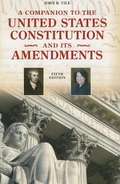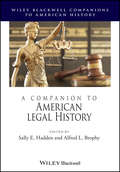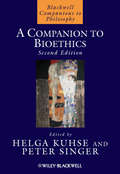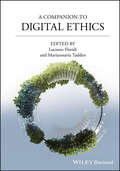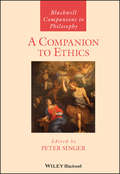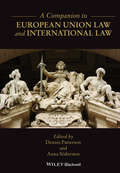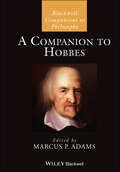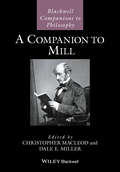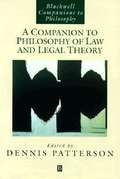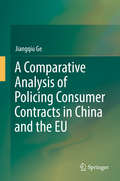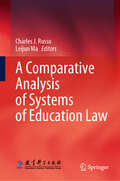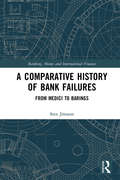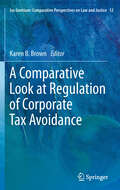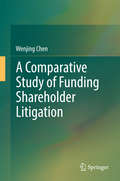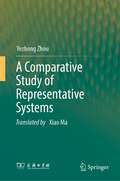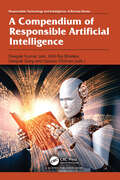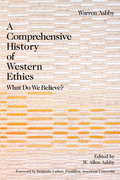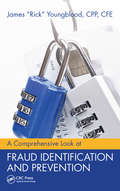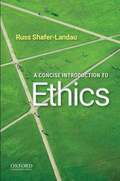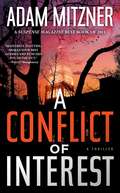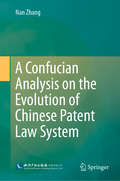- Table View
- List View
A Companion To The United States Constitution And Its Amendments
by John R. VileA Companion to the United States Constitution and Its Amendments is designed to show students just how revolutionary the Constitution was-and how relevant it remains today. It begins by revisiting the key events leading to the Constitution's ratification, including the writing of the Declaration of Independence and the proceedings of the Constitutional Convention, then goes article by article, amendment by amendment, to describe each section of the document, as well as the important court cases that add to its meaning. The fully updated new edition of A Companion to the United States Constitution and Its Amendments reflects a number of significant developments in the five years since the previous edition, including the appointments of new Supreme Court justices, impactful cases involving First Amendment rights for students, religious displays on government property, gun control in the District of Columbia, presidential powers in the context of the war on terror, corporate fraud liability, gay rights, and the 2010 presidential election.
A Companion to American Legal History (Wiley Blackwell Companions to American History #68)
by Sally E. HaddenA Companion to American Legal History presents a compilation of the most recent writings from leading scholars on American legal history from the colonial era through the late twentieth century. Presents up-to-date research describing the key debates in American legal history Reflects the current state of American legal history research and points readers in the direction of future research Represents an ideal companion for graduate and law students seeking an introduction to the field, the key questions, and future research ideas
A Companion to Bioethics
by Peter Singer Helga KuhseThis second edition of A Companion to Bioethics, fully revised and updated to reflect the current issues and developments in the field, covers all the material that the reader needs to thoroughly grasp the ideas and debates involved in bioethics.Thematically organized around an unparalleled range of issues, including discussion of the moral status of embryos and fetuses, new genetics, life and death, resource allocation, organ donations, AIDS, human and animal experimentation, health care, and teachingNow includes new essays on currently controversial topics such as cloning and genetic enhancementTopics are clearly and compellingly presented by internationally renowned bioethicistsA detailed index allows the reader to find terms and topics not listed in the titles of the essays themselves
A Companion to Digital Ethics (Blackwell Companions to Philosophy)
by Luciano Floridi Mariarosaria TaddeoA compilation of cutting-edge, comprehensive insights into digital ethics from leading scholars As digital technologies shape every aspect of today's society, ethical considerations have never been more pressing. In A Companion to Digital Ethics, editors Luciano Floridi and Mariarosaria Taddeo bring together leading experts to analyse key ethical challenges posed by artificial intelligence, privacy, cybersecurity, cyberwarfare, sustainability, digital consent, and many other topics. With a multidisciplinary approach, this authoritative volume introduces all the relevant topics in digital ethics clearly and accessibly, integrating insights from philosophy, law, computer science, and the social sciences. Unlike other collections that focus on specialised research or introductory overviews, this Companion strikes a critical balance—offering a systematic, comprehensive, simple yet rigorous examination of digital ethics that is both conceptually rich and practically relevant. Each chapter can be read as part of the whole or independently. Throughout the book, the contributing authors equip the reader with diverse perspectives for navigating ethical dilemmas in the evolving digital landscape, with an essential list of references and further readings. Integrating real-world examples and case studies throughout, A Companion to Digital Ethics: Explores the ethical value and implications of digital technologies and their applications Offers clear and precise analysis of both current and potential ethical challenges Includes discussions of ethical issues in contexts of technology governance and digital law Helps professionals and policymakers implement ethical principles in AI and digital technologies Contains authoritative and cutting-edge chapters, edited by two leading experts in digital ethics Whether used in academic courses or professional discussions on responsible digital innovation, A Companion to Digital Ethics is an essential guide to understanding and addressing the ethical questions of the digital age. It is a must-have resource for undergraduate and postgraduate students in any academic discipline, as well as policymakers and practitioners seeking to implement ethical frameworks for emerging technologies.
A Companion to Doing Ethics (Blackwell Companions to Philosophy)
by Alan A. Preti Timothy A. WeidelA comprehensive guide to practicing ethics across disciplines and contexts in the 21st century In an era of rapid technological advancements and complex societal challenges, A Companion to Doing Ethics is a vital resource for understanding and navigating the multifaceted role of ethics today. Edited by Alan A. Preti and Timothy A. Weidel, this timely volume explores how ethics has evolved from traditional academic theory into a multidisciplinary practice with real-world applications. Contributions from leading scholars and professionals working in diverse fields, including healthcare, business, public policy, and education, illuminate the dynamic ways ethics is applied in modern contexts. Whether an ethicist working in a university, a member of a hospital ethics board, or a leader at an applied humanities center, the Companion is your indispensable reference and guide. In-depth chapters address a broad range of vital topics—from the role of public philosophy to the need for ethics education in shaping responsible decision making—while offering a rich, interdisciplinary perspective on the challenges and responsibilities of ethical work. Providing insights into what it means to practice ethics in today's world by those actively engaged in the field, A Companion to Doing Ethics: Explores the expanding role of ethics across academic, professional, and public contexts Highlights non-Western and global approaches to ethical practice Examines the function and impact of ethics centers and applied humanities institutions Offers insights into the integration of ethics education across diverse curricula Features multidisciplinary case studies illustrating real-world ethical applications Part of the prestigious Blackwell Companions to Philosophy series, A Companion to Doing Ethics is essential reading for advanced undergraduate and graduate courses in ethics, applied philosophy, and public policy. It is also an invaluable resource for ethics center directors, healthcare ethics board members, business leaders, and educators seeking to deepen their understanding of contemporary ethical practice.
A Companion to Ethics
by Peter SingerIn this volume, some of today's most distinguished philosophers survey the whole field of ethics, from its origins, through the great ethical traditions, to theories of how we ought to live, arguments about specific ethical issues, and the nature of ethics itself. The book can be read straight through from beginning to end; yet the inclusion of a multi-layered index, coupled with a descriptive outline of contents and bibliographies of relevant literature, means that the volume also serves as a work of reference, both for those coming afresh to the study of ethics and for readers already familiar with the subject.
A Companion to European Union Law and International Law
by Dennis PattersonFeaturing contributions from renowned scholars, A Companion to European Union Law and International Law presents a comprehensive and authoritative collection of essays that addresses all of the most important topics on European Union and international law. Integrates the fields of European Union law and international law, revealing both the similarities and differences Features contributions from renowned scholars in the fields of EU law and international law Covers a broad range of topical issues, including trade, institutional decision-making, the European Court of Justice, democracy, human rights, criminal law, the EMU, and many others
A Companion to Hobbes (Blackwell Companions to Philosophy)
by Marcus P. AdamsOffers comprehensive treatment of Thomas Hobbes’s thought, providing readers with different ways of understanding Hobbes as a systematic philosopher As one of the founders of modern political philosophy, Thomas Hobbes is best known for his ideas regarding the nature of legitimate government and the necessity of society submitting to the absolute authority of sovereign power. Yet Hobbes produced a wide range of writings, from translations of texts by Homer and Thucydides, to interpretations of Biblical books, to works devoted to geometry, optics, morality, and religion. Hobbes viewed himself as presenting a unified method for theoretical and practical science—an interconnected system of philosophy that provides many entry points into his thought. A Companion to Hobbes is an expertly curated collection of essays offering close textual engagement with the thought of Thomas Hobbes in his major works while probing his ideas regarding natural philosophy, mathematics, human nature, civil philosophy, religion, and more. The Companion discusses the ways in which scholars have tried to understand the unity and diversity of Hobbes’s philosophical system and examines the reception of the different parts of Hobbes’s philosophy by thinkers such as René Descartes, Margaret Cavendish, David Hume, and Immanuel Kant. Presenting a diversity of fresh perspectives by both emerging and established scholars, this volume: Provides a comprehensive treatment of Hobbes’s thought in his works, including Elements of Law, Elements of Philosophy, and Leviathan Explores the connecting points between Hobbes’ metaphysics, epistemology, mathematics, natural philosophy, morality, and civil philosophy Offers readers strategies for understanding how the parts of Hobbes’s philosophical system fit together Examines Hobbes’s philosophy of mathematics and his attempts to understand geometrical objects and definitions Considers Hobbes’s philosophy in contexts such as the natural state of humans, gender relations, and materialist worldviews Challenges conceptions of Hobbes’s moral theory and his views about the rights of sovereigns Part of the acclaimed Blackwell Companions to Philosophy series, A Companion to Hobbes is an invaluable resource for scholars and advanced students of Early modern thought, particularly those from disciplines such as History of Philosophy, Political Philosophy, Intellectual History, History of Politics, Political Theory, and English.
A Companion to Mill (Blackwell Companions to Philosophy #163)
by Dale E. Miller Christopher MacleodThis Companion offers a state-of-the-art survey of the work of John Stuart Mill – one which covers the historical influences on Mill, his theoretical, moral and social philosophy, as well as his relation to contemporary movements. Its contributors include both senior scholars with established expertise in Mill’s thought and new emerging interpreters. Each essay acts as a ‘go-to’ resource for those seeking to understand an aspect of Mill’s thought or to familiarise themselves with the contours of a debate within the scholarship. <p><p> The Companion is a key reference on Mill’s theory of liberty and utilitarianism, but also provides a valuable resource on lesser-known aspects of his work, including his epistemology, metaphysics, and philosophy of language. The volume is divided into six sections. Part I covers Mill’s life, his immediate posthumous reputation, and his own telling of his life-story. Part II brings together an accessible and comprehensive summary of the various influences on Mill’s thought. Part III offers an account of the foundations of Mill’s philosophy and his thought on key philosophic topics. Parts IV and V tackle issues from Mill’s moral and social philosophy. Part VI concludes with a treatment of the broader aspects of Mill’s thought, tracing his relation to major movements in philosophy.
A Companion to the Philosophy of Law and Legal Theory
by Dennis PattersonAn ambitious survey of the prominent theories, topics, subjects, and discourses currently being tossed about in law school and in undergraduate legal studies. The 45 original essays discuss expected legal preoccupations such as property law and criminal law but also extend the boundaries of those subjects by ruminating on constitutional law and equality, legal positivism, postmodern theories, feminist jurisprudence, law and literature (for lawyers inspired by John Grisham<-->just kidding), and also ranging dialogues in indeterminacy, loyalty, and punishment and responsibility. Annotation c. by Book News, Inc. , Portland, Or.
A Company's Right to Damages for Non-Pecuniary Loss
by Vanessa WilcoxApplying appropriate legal rules to companies with as much consistency and as little consternation as possible remains a challenge for legal systems. One area causing concern is the availability of damages for non-pecuniary loss to companies, a disquiet that is rooted in the very nature of such damages and of companies themselves. In this book, Vanessa Wilcox presents a detailed examination of the extent to which damages for non-pecuniary loss can be properly awarded to companies. The book focusses on the jurisprudence of the European Court of Human Rights and English law, with a chapter also dedicated to comparative treatment. While the law must be adaptable, Wilcox concludes that considerations of coherency, certainty and ultimately justice dictate that the resulting rules should conform to certain core legal principles. This book lays the foundation for further comparative research into this topic and will be of interest to both the tort law and broader legal community.
A Comparative Analysis of Policing Consumer Contracts in China and the EU
by Jiangqiu GeThis book seeks to fill a gap in the existing literature by describing the formulation, interpretation and enforcement of the rules on consumer contracts in China and the EU, and by mapping key similarities and differences. The study addresses selected issues regarding consumer contracts: sources of law in the two jurisdictions are first discussed to set the scene. Afterwards, one preliminary issue - how to define the concept of a consumer contract - and two substantive topics - unfair terms and withdrawal rights - are dealt with. Apart from the descriptive analysis, the book also provides possible explanations for these comparative findings, and argues that the differences in consumer contract rules can be primarily attributed to a disparity of markets. The book offers a valuable resource, particularly for researchers and practitioners in the fields of private law and comparative law.
A Comparative Analysis of Systems of Education Law
by Charles J. Russo Leijun MaThis book focuses on enhanced educator awareness of issues involving the status of the right to education as guaranteed by various legal systems throughout the world, in light of the growing interest in comparative and international studies, including the law. Consequently, this interdisciplinary, comparative book, which includes original chapters by leading academicians with expertise in law and education, is designed to serve as a resource for researchers in education and law as well as policymakers and students. To this end, the book provides readers with an enhanced awareness of the nature of legal systems impacting education throughout the world. Education is the driving force of the world development as well as the basic way to realize human rights and values. At the same time, law plays an important role in the protection, evaluation, guidance, and promotion in the process of the development of education. The book thus has interdisciplinary appeal. Various audiences will find this highly accessible book informative and valuable, including scholars with an interest in Education Law, university faculty and classes (whether involved in teacher preparation or educational leadership), legal practitioners, and university libraries.
A Comparative History of Bank Failures: From Medici to Barings (Banking, Money and International Finance)
by Sten JonssonStarting with Medici and Fugger and ending with Barings and Royal Bank of Scotland under neo-liberal de-regulation, the author gives an account of how a number of banks failed over a 500 year-period. The author offers an explanation of the leading ideas about the world and good society at the time, and summarizes this narrative using Streeck & Schmitter’s three bases for regulation of society: Community (spontaneous solidarity), State (hierarchical control), and Market (dispersed competition). <P><P>The bank failures are presented in the context of social philosophies of the day (scholasticism, mercantilism, neo-liberalism, and libertarianism), and the changing business practices (Bills of Exchange, rents and financial instruments of various kinds). The dominating explanation of financial crises has been market-related. Here, the author argues that managerial failures are an important contributor. He demonstrates the failure of management to act on early signals such as existential risk, strategic stress syndrome, and lack of proper oversight by top management. The author encourages a return to ethical principles for banks, suggesting that his ethical aspect should be at the core of the credit process of banks in the future. <P><P>With its interdisciplinary approach, this book will be an important contribution to the discussion surrounding bank failures. It will interest any scholar looking at the origins of financial crises and will be particularly useful for post-graduate students of economic and financial history, banking, finance and accounting.
A Comparative Look at Regulation of Corporate Tax Avoidance (Ius Gentium: Comparative Perspectives on Law and Justice #12)
by Karen B. BrownThis volume provides a fascinating look at the anti-tax avoidance strategies employed by more than fifteen countries in eastern and western Europe, Canada, the Pacific Rim, Asia, Africa, and the United States. It surveys the similarities and differences in anti-avoidance regimes and contains detailed chapters for each country surveying the moral and legal dimensions of the problem. The proliferation of tax avoidance schemes in recent years signals the global dimensions of a problem presenting a serious challenge to the effective administration of tax laws. Tax avoidance involves unacceptable manipulation of the law to obtain a tax advantage. These transactions support wasteful behavior in which corporations enter into elaborate, circuitous arrangements solely to minimize tax liability. It frustrates the ability of governments to collect sufficient revenue to provide essential public goods and services. Avoidance of duly enacted provisions (or manipulation to secure tax benefits unintended by the legislature) poses a threat to the effective operation of a free society for the benefit of a small group of members who seek the privilege of shifting their tax burden onto others merely to compete in the world of commerce. In a world in which world treasuries struggle for the resources to battle terrorist threats and to secure a decent standard of living for constituents tax avoidance can bring economies close to the edge of sustainability. As tax avoidance is one of the top concerns of most nations, the importance of this work cannot be overstated.
A Comparative Study of Funding Shareholder Litigation
by Wenjing ChenThis book studies the funding problems with shareholder litigation through a functionally comparative way. In fact, funding problems with shareholder lawsuits may largely discourage potential shareholder litigants who bear high financial risk in pursuing such a claim, but on the other hand they may not have much to gain. Considering the lack of incentives for potential shareholder claimants, effective funding techniques should be in place to make shareholder actions function as a corporate governance tool and discipline corporate management. The book analyzes, among others, the practice of funding shareholder litigation in the Australia, Canada, the UK, the US and Israel, and covers all of the typical approaches being used in financing shareholder litigation in the current world. For instance, Israel and Canada (Quebec and Ontario) are probably unique in having a public funding mechanism for derivative actions and class actions, while Australia is the country where third party litigation funding is originated and is growing rapidly. Based on this comparative research, the last part of this book discusses how to fund shareholder litigation in China in context of its social and legal background and what kind of problems need to be solved if certain funding techniques are used.
A Comparative Study of Representative Systems
by Yezhong ZhouThis book demonstrates the social and historical conditions for the existence and development of the representative system and uncovers the laws dictating its occurrence, development and operation. Due to the barriers of language and cultural communication, the understanding of democracy differs in western and Chinese cultures, which leads to many misinterpretations and even bias. The book displays the merits and drawbacks of different forms of democracy on the basis of a comparative study of the different representative systems and argues that different representative systems can co-exist side by side and that the selection of the appropriate form of democracy must reflect the actual conditions in a given country. Therefore, a blind evaluation or criticism is unreliable.The book could provide good opportunities for western scholars to see how the Chinese scholars understand democracy and the representative system, help the westerners to understand the forms of democracy with Chinese characteristics and rationality of the socialist people’s representative system, grasp the true essence of Chinese Constitution and democracy and give up their bias towards China for a better communication and mutual understanding. This book constructs a theoretical framework for studying the representative system and provides a solid foundation for its further research, promoting the improvement and development of constitutional jurisprudence. Even today, the comparative study of the basic theories, system building, and operation of the representative system are of great theoretical significance and practical value in the Chinese political development and reform.The book is primarily intended for graduates and scholars in the areas of constitutional jurisprudence on China and abroad. It is a must-read for constitutional researchers and those who want to know the essential differences between Chinese and Western constitutional jurisprudence.
A Compendium of Responsible Artificial Intelligence (Responsible Technology and Intelligence)
by Deepak Garg Deepak Kumar Jain Gaurav Dhiman Kirti Raj BhateleTaking a broad, multidisciplinary approach to the ethical, legal, and practical dimensions of developing AI, the book puts key issues such as bias, transparency, accountability, and privacy at center stage. From computer science through law and ethics into policy, it lays down the roadmap on which developers, data scientists, and policymakers could bring AI technologies properly attuned to societal values. This book can be read as a resource for those who want to be able to guide the development and deployment of responsibly controlled AI systems.
A Comprehensive History Of Western Ethics
by Warren AshbyOur intellectual history spans more than 2,000 years, yet, surprisingly, we have had no adequate history of Western ethics. A Comprehensive History of Western Ethics fills this void by providing an engaging, thorough, and inclusive history that encompasses both classical and modern perspectives. Author Warren Ashby speaks both to students of history and ethics and to a public interested in but often perplexed by moral values in contemporary life. Ashby embraces all who are concerned with expanding human rights, finding new ways to think about moral experience, and discovering an ethical perspective appropriate for their lives. By exploring past ethical problems, we can prepare for the future's challenges.Included with the commentary on the writings of great thinkers are in-depth discussions of Greek, biblical, and Stoic ethics; Augustine, Aquinas, and medieval views; the Renaissance, the Reformation, and ethics in the age of science; as well as the Enlightenment, Romanticism, and the last Western century.
A Comprehensive Look at Fraud Identification and Prevention
by James R. YoungbloodDesigned to educate individuals, loss prevention associates, businesses, and consultants on the many faces of fraud in today's technologically advanced society, this book presents tips, advice, and recommendations for fraud awareness, protection, and prevention. It covers employee theft, organizational fraud, consumer fraud, identity theft, Ponzi and Pyramid schemes, and cyber crime/ fraud. It also examines how some fraud typologies can overlap and co-mingle and the best ways to make an organization's or individual's financial assets a harder target for fraud and victimization.
A Concise Introduction to Ethics
by Russ Shafer-LandauThis book offers a condensed and exceptionally well-written introduction to the essential moral theories. Based on Russ Shafer-Landau's best-selling primer on ethical theory, The Fundamentals of Ethics, this briefer volume retains the longer one's content advantage over competing books by addressing issues that other texts omit, including the good life (value theory), natural law, and prima facie duties. <p><p>It also incorporates discussion questions and case studies at the end of each chapter, giving students the opportunity to apply ethical theories to real-world moral problems. A perfect companion to Shafer-Landau's anthology, The Ethical Life, this volume's compact size and low price make this book an ideal complement to any course where it is important that students understand moral theories.
A Concise Restatement Of Torts
by Ellen Bublick American Law Institute StaffThis abridgement of the American Law Institute’s Restatement of Torts (2nd and 3rd), which has been cited by the courts almost 80,000 times, is intended primarily for use in law school torts courses as collateral support for the main casebook. The central ingredient of this compilation, assembled and edited by Dan B. Dobbs Professor of Law Ellen Bublick of the University of Arizona, is the Restatement of Torts, 3d - Liability for Physical and Emotional Harm, completed in 2011. Strong content contribution comes also from Torts 3d Products Liability (1998) and from Torts 3d - Apportionment of Liability (2000).
A Confession (Penguin Great Ideas)
by Leo TolstoyDescribing Tolstoy's crisis of depression and estrangement from the world, A Confession is an autobiographical work of exceptional emotional honesty. It describes his search for 'a practical religion not promising future bliss but giving bliss on earth'. Although the Confession led to his excommunication, it also resulted in a large following of Tolstoyan Christians springing up throughout Russia and Europe. Throughout history, some books have changed the world. They have transformed the way we see ourselves – and each other. They have inspired debate, dissent, war and revolution. They have enlightened, outraged, provoked and comforted. They have enriched lives – and destroyed them. Now Penguin brings you the works of the great thinkers, pioneers, radicals and visionaries whose ideas shook civilization and helped make us who we are.
A Conflict of Interest: A Conflict Of Interest And A Case Of Redemption
by Adam MitznerA stunning debut thriller in the bestselling tradition of Scott Turow and John Grisham! Alex Miller is a criminal defense lawyer leading the life he always imagined. At thirty-five, he is the youngest partner at New York City's most prestigious law firm, with a beautiful wife and a perfect daughter. When Alex's father suddenly passes away, Alex is introduced to Michael Ohlig, a rich and powerful man who holds an almost mythical place in his family lore. But Alex is surprised when Ohlig admits that he's in serious legal trouble, accused of crimes involving hundreds of millions of dollars. Alex agrees to take on Ohlig's defense. Through the course of two trials, secrets are revealed that force Alex to question whether any of the people in his life are who they appear to be. Most importantly, he must decide whether the identity he projects to the world is the man he truly is or even wants to be. With its powerful voice, page-turning tension, and strong cast of characters, A Conflict of Interest will captivate readers until its electrifying conclusion.
A Confucian Analysis on the Evolution of Chinese Patent Law System
by Nan ZhangThis book comprehensively discusses the main features of the Chinese patent law system, which not only legally ‘transplants’ international treaties into the Chinese context, but also maintains China’s legal culture and promotes domestic economic growth. This is the basis for encouraging creativity and improving patent law protection in China. The book approaches the evolution of the Chinese patent system through the ancient Chinese philosopher Confucius’s classic principle, offering readers a fresh new way to understand and analyze Chinese patent law reforms, while also outlining how Confucian insights could be used to improve the enforcement of patent law and overall intellectual property protection awareness in China. It examines ancient Chinese innovation history, explores intellectual property from a Confucian perspective, and discusses the roots of Chinese patent law, as well as the past three amendments and the trends in the ongoing fourth amendment. In addition to helping readers grasp the mentality behind the Chinese approach to patent law and patent protection, the book provides an alternative research methodology and philosophical approach by demonstrating Confucian analysis, which provides a more dynamic way to justify intellectual property in the academic world. Lastly, it suggests future strategies for local industries in the legal, cultural and sociological sectors in China, which provide benefits for domestic and overseas patent holders alike. The book offers a valuable asset for graduate students and researchers on China and intellectual property law, as well as general readers interested in Asian culture and the philosophy of law.
